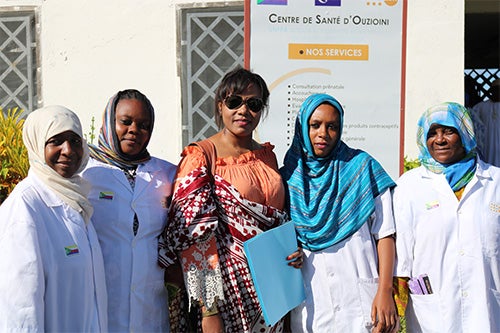News
In this Comorian community, an ambulance horn is music to one’s ears
- 03 September 2019
News
OUZIOINI, Comoros – Who has not heard the horn of the Ouzioini ambulance? Up to five times a week, the vehicle ferries women and children some 50 kilometres from the rural Ouzioini District to the capital, Moroni, for urgent maternal and paediatric care.
The ambulance’s distinctive low-pitched horn is a welcome sound to Ouzioini residents, who, until 2011, had to find their own transport to emergency care – at great expense.
“We are no longer in the situation we once faced, when patients were forced to pay more than 50,000 Comorian francs to rent a car to be evacuated to Moroni. Sometimes patients would die because they did not find a vehicle in time,” midwife Assiata Chissi explained.
Most of the ambulance’s passengers are women facing pregnancy complications. “Now, once we have found that a patient needs to be evacuated, we take our ambulance directly,” she said.
“The first time I accompanied my older brother's wife to give birth, she had complications and there was no ambulance,” Mariam Abdou, a local resident, recalled. “I had to rent a car for 40,000 Comorian francs. When we arrived at Elmaarouf Hospital in Moroni, the baby and his mother had suffered so much.”
The second time her sister-in-law needed urgent maternal health care, the cost was no longer a concern. With the ambulance, “we evacuated her to Moroni,” Ms. Abdou said.

Not so long ago, the Ouzioini District Health Centre – which covers 19 villages and thousands of people – was not fully equipped to help women and children in need. The UNFPA-supplied ambulance has been “a big step forward for the centre,” said Abdoulhwahabi Mohamed Youssouf, the centre’s chief medical officer.
Additional efforts to improve care are also under way. “We hope to reduce evacuations by offering good quality services at the centre. We need to train more staff and motivate staff to overcome all these challenges,” Dr. Youssouf added.
UNFPA is helping to upgrade the health centre by providing “medical equipment, equipment for the maternity ward and all contraceptive products,” said Midwife Major Allaouia.
UNFPA has also subsidized the cost of delivery kits, which contain supplies to ensure a safe childbirth, such as sterile plastic sheets, gloves, razor and blanket.
The savings have enabled the health centre to purchase an ultrasound machine so that expectant mothers no longer have to travel to Moroni for these services.
Since 2016, UNFPA has also helped pay for two of the midwives on the health centre’s maternity team, enabling the facility to function 24 hours a day, 7 days a week.
“In the maternity ward, we take care of pregnant women. We do antenatal care, delivery and family planning," Ms. Chissi explained.
The midwives are beloved by the community. In fact, Ms. Chissi – who is widely known by the nickname Mother Amina – retired from her role as a state midwife, but came back part-time at the request of local residents.
Her dedication has made a world of difference to her patients. “When I started childbirth contractions, I went to the Ouzioini Health Centre. The midwife examined me and told me that my situation required evacuation to Moroni,” recalled Hassanati Hamadi.
“We took the ambulance, and despite the distance everything went very fast and I did not suffer too much. I gave birth by Caesarean section. I was accompanied by Assiata Chissi, who took care of me all the way.”
Today, the maternity team can handle nearly everything that comes their way.
“In a week, we perform an average of seven deliveries – sometimes normal and sometimes with complications,” Ms. Chissi said.
The centre has not recorded any maternal deaths since 2012.